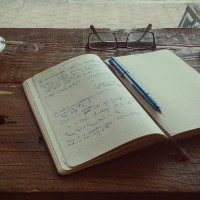From John Rognes on the Alg-Top mailing list:
"I spent time with Waldhausen's "Algebraic K-theory of spaces" when I was a PhD student. It was nicely typed up, but at some point it was recognized that a third axiom in the definition of a cylinder functor was not needed, and instead of retyping, Waldhausen's inserted some bars from "Alborada del gracioso" by Ravel, sometimes translated as "Morning song of the clown" or "Fool's morning song". Later the paper was accepted by a well-known journal, but the publisher did not want to include the musical score. Waldhausen then withdrew the paper. Andrew Ranicki was visiting Bielefeld on that day, and in the process of editing proceedings from a conference at Rutgers, which I believe Waldhausen did not attend. Waldhausen then offered his paper for these proceedings, the Springer LNM 1126, preserving the bar of notes, of course."
Here's the paper:
Waldhausen, F. (1985). Algebraic K-theory of spaces. In: Ranicki, A., Levitt, N., Quinn, F. (eds) Algebraic and Geometric Topology. Lecture Notes in Mathematics, vol 1126. Springer, Berlin, Heidelberg. https://doi.org/10.1007/BFb0074449
From John Rognes on the Alg-Top mailing list:
"I spent time with Waldhausen's "Algebraic K-theory of spaces" when I was a PhD student. It was nicely typed up, but at some point it was recognized that a third axiom in the definition of a cylinder functor was not needed, and instead of retyping, Waldhausen's inserted some bars from "Alborada del gracioso" by Ravel, sometimes translated as "Morning song of the clown" or "Fool's morning song". Later the paper was accepted by a well-known journal, but...




